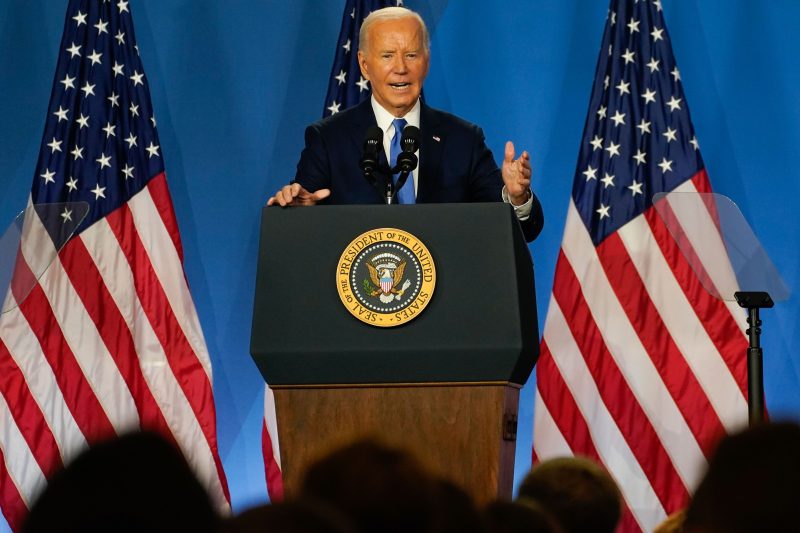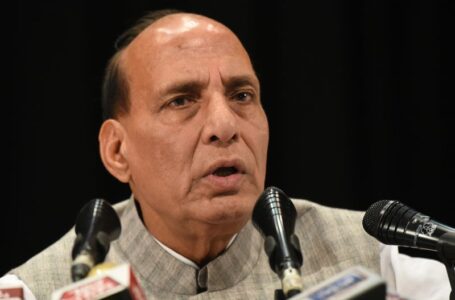Burglars break into Windsor Castle estate and steal farm vehicles
Biden faces more calls to withdraw as he visits Michigan to rally support


DETROIT — President Biden on Friday faced a continuing drip of statements from Democrats urging him to step aside as their presidential nominee, as at least two more lawmakers joined the calls for him to end his candidacy and underlined that this week’s high-stakes news conference had not squelched concerns in the party that he would struggle to defeat Donald Trump.
Friday’s two defectors — Reps. Brittany Pettersen (D-Colo.) and Mike Levin (D-Calif.) — joined three of their Democratic colleagues who had asked Biden to pull out Thursday night after the news conference concluded. In all, 21 House members had urged the president to reconsider his candidacy as of late Friday — about 10 percent of all House Democrats — as well as one senator, Peter Welch of Vermont.
The reviews of Biden’s performance Thursday were mixed, as he showed a command of complex foreign policy issues but stumbled through some answers and mixed up names. That was not enough for lawmakers like Petterson, who represents a relatively safe district in Colorado.
“Joe Biden saved our country once, and I’m joining the growing number of people in my district and across the country to ask him to do it again,” she said Friday morning. “Please pass the torch to one of our many capable Democratic leaders so we have the best chance to defeat Donald Trump.”
Petterson was followed later in the day by Levin, who represents a swing district and rarely speaks out on divisive issues. “Making this statement is not easy,” said Levin, adding that he had talked to several hundred constituents and supporters about the matter. “I have deep respect for President Biden’s five-plus decades of public service … But I believe the time has come for President Biden to pass the torch.”
They joined Democratic Reps. Jim Himes of Connecticut, Scott Peters of California and Eric Sorensen of Illinois, who had made similar statements shortly after Biden’s news conference ended Thursday. The drumbeat of disaffection is creating an increasingly damaging dynamic for Biden and the Democratic Party, producing regular criticism without altering the campaign’s trajectory or visibly affecting the president’s determination to stay in the race.
But party leaders appear uncertain how to change that.
House Minority Leader Hakeem Jeffries (D-N.Y.), in a letter to colleagues Friday, said he had met privately with Biden the previous night to discuss the election and convey the sentiments of his fellow Democratic lawmakers. Jeffries did not specify what he had told the president or how Biden had responded, but his letter notably did not urge Biden to stay in the race or say that House Democrats were behind his candidacy.
“I directly expressed the full breadth of insight, heartfelt perspectives and conclusions about the path forward that the Caucus has shared in our recent time together,” Jeffries wrote in his “Dear Colleague” letter.
That left the landscape where it has been for some time: A Democratic Party deeply divided over the path forward, with the prospect of a second Trump presidency, which most Democrats consider catastrophic, hanging over every move.
The president continued his behind-the-scenes effort to shore up his support, joining a virtual meeting with BOLD PAC, a group affiliated with the Congressional Hispanic Caucus. Biden also delivered remarks and took questions during a virtual meeting with leaders from the Congressional Asian Pacific American Caucus and members of that bloc’s political arm.
Biden then headed to Michigan for a late-afternoon rally, part of his ongoing effort to dispel questions about his vigor and ability to wage a robust campaign. He planned to focus on Project 2025, a document assembled by the conservative Heritage Foundation as a proposed agenda should Trump retake the White House.
“Folks, Project 2025 is the biggest attack on our system of government and on our personal freedom that has ever been proposed in the history of this country,” Biden planned to say, according to excerpts released by the campaign. The document contains such goals as sharp limits on abortion and cutting funds to fight climate change and provide health care for the LGBTQ community.
“It’s time for us to stop treating politics like its entertainment or a reality TV show,” Biden plans to continue. “Another four years of Donald Trump is deadly serious. Project 2025 is deadly serious.”
On the way to the rally, Biden stopped by a campaign organizing event in a Detroit suburb, joking twice about his age and ending his 14-minute remarks by reassuring organizers that he’s “okay.”
“That’s why I’m running to finish this job. There’s more to do. I know I’m only 41,” Biden said. “I promise you I’m okay.”
Earlier in his remarks, as he touted his administration’s accomplishments on health care, the economy and manufacturing, he joked that he was “270 years old.”
Biden walked around the room as he spoke, stopping by each table full of organizers. He spoke about the times he said pundits, reporters and strategists had doubted him, adding that he had a record of overcoming such doubts, including in the 2020 presidential race.
“With age comes a little wisdom,” Biden said. Referring to Trump, he added, “The alternative is not much of an alternative.”
Earlier, in a news conference on Air Force One, campaign spokesman Michael Tyler said the president hoped to make the case to doubters, including the Congress members asking him to step aside, that he deserved another four years.
“The president understands there’s still some anxiety on the Hill. I think we all understand that,” Tyler said. “That’s why he’s laser-focused on demonstrating that he’s the best person to take on Donald Trump.”
Rep. Debbie Dingell (D-Mich.) said that despite troubling polls for Democrats in Michigan, a state Biden almost certainly must win to retake the White House, the state remains “competitive.”
Some Democrats said they were looking forward to Trump’s imminent announcement of a running mate and to the Republican National Convention taking place next week, hoping that would shift some of the nation’s focus to the GOP’s own vulnerabilities, including Trump’s own misstatements and often rambling speeches.
Following several days of shocked silence after Biden’s debate performance against Trump on June 27, when he struggled to find words and complete sentences, a steady stream of Democrats have said publicly that Biden should step aside and let someone else head the party’s ticket, starting with Rep. Lloyd Doggett (D-Texas) on July 2.
Hours before Thursday’s news conference, four more Democratic House lawmakers joined that chorus, voicing fears that Biden would have difficulty defeating Trump because of voters’ concerns about his age. Biden is 81 and Trump is 78, but polls suggest voters are significantly more worried about Biden’s capacity than Trump’s.
Biden began the news conference by touting his accomplishments at this week’s NATO summit and his broader record as president, providing an implicit defense of his continued candidacy. But early on in the question-and-answer session, he mistakenly referred to Vice President Harris as “Vice President Trump,” a verbal slip that elicited audible gasps in the room and frustration from already-nervous Democrats.
He took issue with a report that he had told a group of supporters he needed to end his days at 8 p.m.
“What I said was, instead of my every day starting at 7 and going to bed at midnight, it would be smarter for me to pace myself a little more,” Biden said. “Instead of starting a fundraiser at 9 o’clock, start it at 8 o’clock — people get to go home by 10 o’clock. That’s what I’m talking about.”
Biden also delivered lengthy, complex answers to a range of foreign policy questions and argued forcefully that he is the most qualified person to defeat Trump and govern the country. Aides seized on those answers, saying they should lay to rest any questions that may have arisen after the debate about the president’s intellectual capacity and mental agility.
The president’s visit to Michigan, however, could highlight another key political vulnerability, one that was bedeviling his campaign well before the June debate: Arab Americans, Muslims and liberals deeply angered by his response to Israel’s war in Gaza. Many have said they will withhold their votes because of his failure to call for a permanent cease-fire and cut off U.S. military aid to Israel.
More than 38,000 Palestinians have died in the enclave in the past nine months according to the Gaza Health Ministry. Israel launched a punishing military assault in Gaza after Hamas militants crossed the border into Israel on Oct. 7, killing 1,200 people and taking some 250 hostage.
Michigan is home to the country’s largest Arab American population, with about 300,000 people who claim ancestry from the Middle East or North Africa. Michigan’s Arab and Muslim community overwhelmingly supported Biden in 2020, when he won the state by 154,000 votes.
Abdullah Hammoud, the mayor of Dearborn, Mich. — where Arab Americans make up the majority of the population — said he has not spoken to White House officials for several months about his constituents’ concerns over the war in Gaza. Even as Gaza receded from the headlines in recent weeks, Hammoud said, the situation on the ground has continued to worsen and residents have not lost focus on the issue.
“Earlier this year, the president sent his senior White House officials to listen to the constituency he sought support from four years ago, and there have been no meaningful steps since. Things have only gone backward,” Hammoud said, referring to a Feb. 8 meeting in which senior national security officials visited Dearborn and met with the mayor and other officials.
“We’re looking for a president with the backbone to call for a cease-fire,” Hammoud added. “This is not the president that was promised to us four years ago.”
Most public polls show Biden trailing Trump in Michigan, which is key to the president’s narrowing path to victory — he has few, if any, paths without it.
The Biden campaign argued in a memo obtained by The Washington Post on Thursday that it can win by focusing on the “blue wall” states of Michigan, Wisconsin and Pennsylvania.











